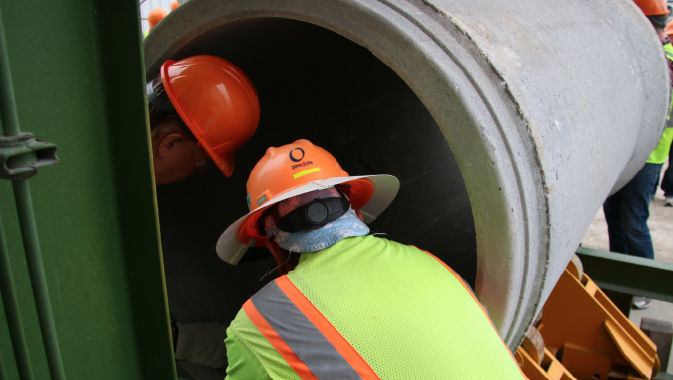As the world’s most commonly used building material, concrete offers a wealth of features that make it the material for building projects everywhere, both above and below ground. Behind the concrete that is so commonly used for infrastructure in America is the American Concrete Pipe Association (ACPA) which advocates, represents and educates its members, as well as the collective concrete pipe industry.
~
“Our role is to be the voice of the concrete pipe industry, representing members in a way that puts our vision and interest forward for the members, supporting the needs of the membership to get us in front of folks that ultimately make decisions on products that we can be a part of,” explained ACPA President Russell Tripp. There are over four hundred plants operated by ACPA members in North America, and the organization represents concrete pipe producers in more than forty countries.
“We bring a structure to the project,” he also noted. “We have a history of providing long-term, durable, hundred-plus year service life products which is the requirement for many states. It’s also just in the best interest of the public to have a long-term product that you don’t have to worry about. You can sleep well at night and know that your infrastructure needs underground are taken care of.”
This year, ACPA is celebrating 110 years representing the industry. It was established in 1907 in Ames, Iowa by a small group of individuals from across the U.S. and Canada on behalf of the manufacturing sector that made concrete drainage tile for farms and organized under the name Interstate Cement Tile Manufacturers Association. The association used this opportunity to share ideas and knowledge while establishing a quality standard against which products could be measured.
The organization’s name was changed to the American Concrete Pipe Association in 1914 and continued its good work, growing along with the industry as cities around the country experienced an influx of rural inhabitants moving to urban areas. As demand for its products increased, ACPA and its members were there to support the infrastructure developments taking place.
Since its inception, it has been at the heart of advocacy, education and legislative changes that affect the construction and concrete pipe industry as a whole. From its headquarters in Irving, Texas, ACPA has achieved great success in speaking for the industry, but it has become so much more.
In 2005, federal highway reauthorization legislation (SAFETEA-LU) eliminated engineers’ right to choose materials in the procurement process. A main effort of ACPA since then has been to fight for the right of engineers to decide for themselves which material best meets the needs of projects.
In 2012, its lobbying and education efforts were successful as MAP-21 legislation once again extended the opportunity for engineers to choose their preferred concrete, corrugated metal or thermoplastic pipe to meet project specifications.
ACPA was also instrumental in 2015 when the FAST Act amendments were put before the government and rejected. These changes would have diminished the language of the 2012 legislation and thus, once again reduced the engineers’ right to choose.
“The good news on that is we continue to have the support of the engineering community,” Tripp stated. “A lot of different agencies are aware that they have a choice and that they want to continue to have a choice, and of course it works both ways as far as having a choice. Somebody can choose any product they want, but we want to make sure they choose the product that they want to choose based on the conditions and based on their needs.”
Now, ACPA is taking its efforts to the state level to ensure that legislation continues to support choice. “It’s important to get the facts in front of individuals so they can make an informed decision, and we feel that we do that well, and we want to continue to do that for the industry – for the agencies – and not try to oversell but not try to undersell the benefits of what we provide versus what other products provide,” Tripp says.
“Since 2005, that continues to be a challenge even today, with legislation that comes down or has been promoted to take away that choice, so that’s a constant challenge for us both at the state and federal level,” he added.
In addition to its lobbying efforts, ACPA is heavily involved with industry education through its Pipe School and Pipe Show, Concrete Pipe Week, Concrete Pipe University (CPU), professional development courses, Professional Pipe Promotion Training Program (P3), as well as a quality assurance program to promote and sustain quality and safety. It also holds events like its annual concrete pipe week.
There are many benefits to becoming a member or an affiliate of ACPA, Tripp explained. “You get to be part of expressing your voice in shaping our goals and strategies for the future. You get to attend a number of different types of training and education sessions at discounted rates.”
“We bring the education to the agencies. We bring the agencies to the education through our annual Pipe School. This year it’s going to be at Middle Tennessee State University in the middle of January, so we’re excited about bringing in a lot of agency folks – in addition to our members – to participate. We invite and attract state [departments of transportation] and design engineers to purchase with us and participate.”
“You get to be part of an industry that’s focused on safety and education and providing products that meet the needs of customers, and you can feel really good about that. Some other benefits are that you get to learn from others in the industry. We really do a great job of working together. Even though there are different companies, there are so many commonalities that we can talk about to improve our products together,” he added.
Research efforts are another key focus of the organization. The ACPA’s research foundation is conducting research aimed at improving the products and their performance, as well as identifying new best practices. Tripp is excited by those opportunities, although he is not in the position to share exactly what they are.
At the 2016 APCA Awards, John Finch of Rinker Materials was awarded the Richard E. Barnes Award. The award is the highest recognition of support and service to the industry. Awards were also given to recognize quality output, safety and industry contributions.
The 2017 APCA Project Achievement Award recognized the efforts of Northern Concrete Pipe for its precast design that enabled expedited replacement of aging infrastructure in Michigan. Michigan Department of Transportation awarded the contract to Davis Construction to fast-track the replacement of a cast-in-place culvert that was built in 1946 with a precast concrete box culvert.
Tripp also highlighted the first $2500 Besser Pipe Industry Scholarship, an award that was established in partnership with the ACPA Foundation and the employee-owners of Besser Company and was presented at the National Concrete Pipe Week in 2016.
The inaugural scholarship winner, Joe Pelica, is a second-year mechanical engineering technology student at Delta College in Bay City, Michigan, as well as a full-time production employee of Northern Concrete Pipe, an ACPA member.
When asked what motivates him to lead ACPA, Tripp said it is “the fact that we’re making a difference in the community. We are able to see what people need, and we are able to deliver on that.”
“We do that with a great staff and some great leadership on our board who directs the activities,” he continued, “but it really gets me excited to see the success of making a change in a specification, delivering what someone really needs and just working together to focus on where we’re headed in the future.”
The ACPA will continue adding resources to support its growth through training, education and technical assistance. “As far as capacity for growth opportunities with our members and the products that they offer, there is a big opportunity in their plants to increase capacity, which is a huge thing, especially with some of the potential infrastructure spending coming up,” Tripp explained.
He says that his goal for ACPA is to remain, “relevant, visible and known. I mean relevant to our members, relevant to the industry and visible by being out there in front of individuals, so they know who we are, so they will be able to reach out to us as we’re known as a trusted resource. And, with 110 years behind it, it continues to have a significant influence as we work toward our overall goal of increasing concrete pipe market share.”













